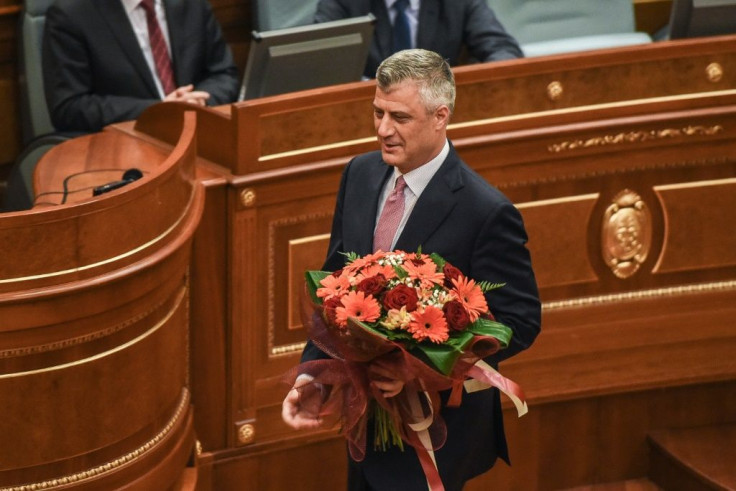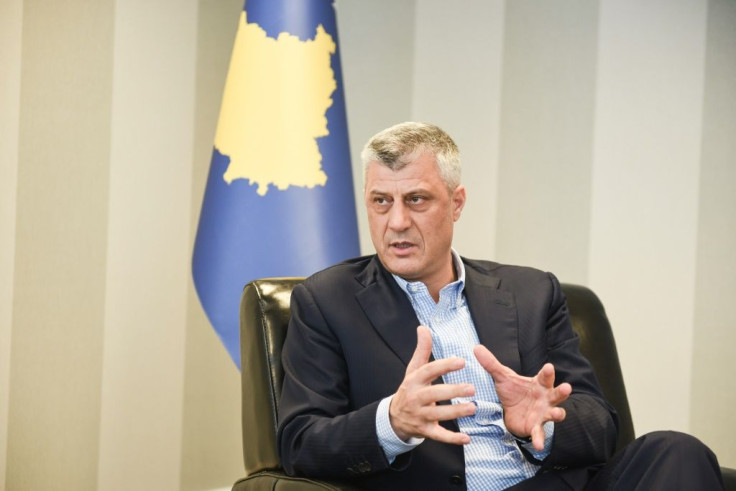Kosovo's Hashim Thaci, Rebel-turned-politician Accused Of War Crimes

Hashim Thaci, the former rebel leader who fought for Kosovo's independence and has dominated the young democracy ever since, was hit Wednesday with charges of war crimes and crimes against humanity.
For nearly two decades President Thaci has played a central role in Kosovo's political scene, making his name during the 1998-1999 war with Serbia as political leader of the pro-independence ethnic Albanian Kosovo Liberation Army (KLA).
The tall, silver-haired 52-year-old, who also served more than seven years as prime minister, saw his popularity soar when former province Kosovo declared independence from Serbia in 2008 just three months after he won an election.
But his image has been tarnished by a 2010 Council of Europe report that linked him to organised crime and organ smuggling during and after the war with Serbia -- charges he has always denied.
On Wednesday special prosecutors in the Hague tasked with investigating those allegation announced a laundry-list of charges, including murder, enforced disappearance of persons, persecution, and torture.
Thaci and other suspects "are criminally responsible for nearly 100 murders", the prosecutors said, adding that they were still seeking approval of the indictment from a pre-trial judge at the EU-backed court.
Born on April 24, 1968 in the Drenica region of western Kosovo -- a hotbed of separatism among Kosovo's ethnic Albanian community -- Thaci was involved in passive resistance to the Belgrade authorities from the early 1990s as a student.
He later moved to Switzerland -- home to a large Albanian nationalist diaspora -- where he studied history.
Together with ultra-leftists in the diaspora, he became frustrated by the policy of peaceful opposition to Belgrade's repression of Albanians followed by late Kosovo president Ibrahim Rugova.

Instead, he corralled other like-minded ethnic Albanians into an underground guerrilla army, the KLA, to take on the forces of then Serbia strongman Slobodan Milosevic.
Thaci earned the nom de guerre of "Snake" during the conflict, serving as the KLA's political leader.
More than 13,000 lives were lost in the war that ended after NATO intervened in 1999, ousting Serb forces and establishing UN administration over Kosovo.
Thaci then downed his guns and donned a suit, becoming known in the West as the "Gerry Adams of Kosovo" after his counterpart in Sinn Fein, the political wing of the Irish Republican Army.
He won elections in November 2007 after the death the previous year of Rugova, who was regarded as the father of the nation and had proved unbeatable in all post-war polls.
Three months later, under Thaci's leadership, Kosovo declared independence from Serbia.
He has since remained at the heart of Kosovo politics, despite accusations of corruption and state capture by his critics.
Recently he has devoted his energies brokering a deal with former foe Serbia, which still denies Kosovo's independence.
He has always denied any wrongdoing during the war.
In 2018 he told AFP he was ready to respond to the the war crimes tribunal "at any moment, under any circumstances" and "with all my capacity".
"I have nothing to hide," he said.
© Copyright AFP 2024. All rights reserved.





















